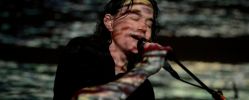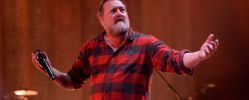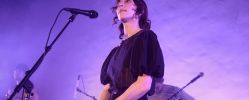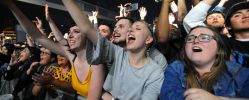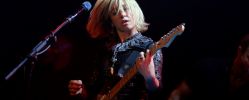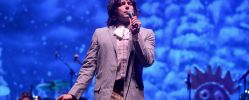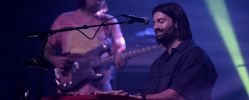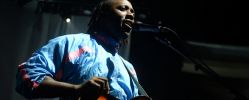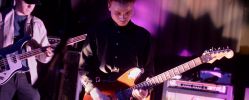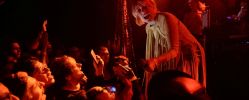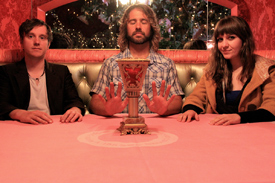
Dylan Trees at The Airliner
 My neighbor is writer and guitarist Jeremy Simon of Dylan Trees. One night, never having said boo to the guy, I crash his birthday bash with ten slices of Abbott’s pizza to make first contact. Soon we’re catching up on LA bands, footnotes and influences, Brian Wilson’s “Smile” and Nick Drake. Jeremy’s from London, closed and yet endless. I like his positive impression of Los Angeles and didn’t think Londoners left King Henry VIII and the Daleks behind for our music scene.
My neighbor is writer and guitarist Jeremy Simon of Dylan Trees. One night, never having said boo to the guy, I crash his birthday bash with ten slices of Abbott’s pizza to make first contact. Soon we’re catching up on LA bands, footnotes and influences, Brian Wilson’s “Smile” and Nick Drake. Jeremy’s from London, closed and yet endless. I like his positive impression of Los Angeles and didn’t think Londoners left King Henry VIII and the Daleks behind for our music scene.
He invites me to review Dylan Trees at The Airliner.
THE AIRLINER
The Airliner is off the 405 to the 10 to the 5 North, exit Broadway. Go a few blocks down the boulevard and you’ll see it. Tonight the sign says, “Go Folk Yourself”.
Inside is a three story doll house with separate stages and self-contained atmospheres. Lowest, a small barroom nook run by Gordy the Barkeep. A brash young man observes me riffing into my digital recorder and says, “Nothing wrong with folk.” No there ain’t. I ain’t no post-punk skeleton gone trick-or-treating. I listen to Steeleye Span, John Renbourn, The Incredible String Band, Donovan, Joan Baez, Joni Mitchell, The Indigo Girls, Beck, Michelle Shocked, Elliott Smith, Freedy Johnston, Lach’s Antihoot Night at The Sidewalk Cafe… And I know the theme to “Bumblebee Tuna”.
I walk up a spiral staircase to a large unused kick-ass outdoor stage. Beneath the nighttime sky, the staircase empties into a market where a woman sells clothes and oils. I look for Jeremy on the top level. There’s a blonde in her early twenties playing the small stage, xylophone with her right hand and harpsichord with her left, Bach-like fugues on the organ, impassioned piano, singing a bit like Julee Cruise. A crowd gathers.
Monica Olive, singer for Dylan Trees, finds me in the corner grooving. She’s happy to remind me that she, being vegetarian, welcomed the mushroom slices I brought over. She’s dolled up in very dramatic evening make up. Quite fashionable. Jeremy’s wearing a white evening jacket, white pants and a shirt that says “I Like Acid”. He introduces me to Rob Fanter, the band’s watchful and philosophic programmer, bassist and drummer.
Tonight’s all screwed up, Jeremy relates. Dylan Trees were supposed to go on at 11 but the second stage is closed, so it’s closer to 12:30 downstairs.
So we’ve got some time.
DYLAN TREES INTERVIEWED — Jeremy Simon, Rob Fanter, Monica Olive
MFV: When did Dylan Trees come together?
J: Dylan Trees was originally a moniker I used in London when I used to play folk clubs and open mics. It was a bit of an alter ego almost. But when I came to LA, I think my ambition for what I wanted to do musically exceed being just one person with a guitar onstage. At the same time, I met Mr. Fanter, and we really hit it off personally and music-wise. Some interesting divergent and convergent music tastes…”
R: Yeah, yeah. I think we have, I was listening to [The Clash] “Sandinista!” on the way over here and I was thinking about how odd it was that both Jeremy and I are obsessed with “Sandinista!”. Above “London Calling” or anything like that.
J: What I find interesting is a lot of my influences are actually American. In London, I was quite obsessed with Americana and country and American folk music.
MFV: What kind?
J: All the usual suspects. Woody Guthrie, The Birds…
R: Kenny Rogers…
MFV: All is forgiven…
J: …which would be exotic, interesting in London. I got here and met Rob to find that Rob, born and bred American, is kind of obsessed with English music.
R: Mainly English electronics. I think we’re wearing the wrong outfits tonight. I should probably be wearing the shirt that says “I Love Acid”. And you should be dressed like Johnny Cash.
MFV: Monica, how do you complete this triad?
M: (laughing) I’m not going to go into detail.
J: When me and Rob started writing songs together, and making music, I wanted there to be another dimension, definitely a female influence in the band. A lot of the bands I adore, like Belle and Sebastian, definitely have a strong female presence. I think it makes everything a lot more balanced.
MFV: Monica, from what quadrant do you hail?
M: I’m from New York, actually. I have a very strong jazz background. And I’ve always loved jazz music and.. I guess jazz and blues are my main influences forever… that always brings about the beauty of the harmony.
J: I was instantly drawn to Monica’s voice because it added that dimension. Without her, the music would get a little cold, but Monica warms everything up. My cold British heart.
M: Which is ironic because I’m from New York.
J: There you go. Where the wind blows cold.
MFV: Rob, are you an Angelino? Born and bred out here?
R: No, I’m from Iowa.
J: Rob’s the most Californian person in Iowa.
R: California was invented in Iowa.
J: Deep in a mountain, they forged it out of gold and plastic.
MFV: You just came off of a tour. Would you like to talk about it?
M: It was amazing!
R: So much fun!
M: It was fucking amazing!
MFV: Was it your first tour as a band?
J: It was.
M: I was a little bit nervous at the get-go. It was like, this will make us either love each other or hate each other! And we fucking love each other!
J: We proved we could spend three days in a small car driving up and down the coast. And not actually want to murder each other. Well, we murdered the fourth member…
R: …and a stranger in each city as a blood sacrifice to the band.
MFV: How many dates did you play?
R: We did three live shows and one radio show.
MFV: Which station?
J: The Coast 101.3 Kahuna and Amy, the Morning Show. They bring you a heady diet of yot-rock and chart hits.
M: And Lady Gaga.
R: They tempt you with pictures of Kenny Loggins but when you turn on the radio, it’s Lady Gaga. It’s bait and switch.
MFV: Were you supporting the music that we’ll be hearing tonight? Are there songs worked out that are only for the road?
J: We played a couple of songs for the first time… every time you play live, you like to try new stuff and test the grounds. And we found they went over really well and are fast becoming our favorite songs to play live. Yeah, we definitely extended our repertoire.
MFV: Did you open for a national? Or a regional?
R: A global act. We opened for these French guys in San Francisco. “Le Pénélope”.
(Some musing on how to pronounce that.)
R: They were super cool guys. It was like French electronic pop. They kind of sounded like New Order.
J: It was cold French pop that you just want to dance to.
M: We danced like maniacs. We had managed to find on the road these little laser individual finger lights. And so everybody had their little laser lights and we were like dancing like it was a rave party…
J: What I learned about being on the road is that the best thing is exploring little crappy truck stops, you know, service stations and stuff. And they have amazing weird stuff to sell, especially when you’re near Bakersfield. Who knew that in the middle of Bakersfield you could find individual finger disco lights.
M: We bought them out. We bought out their entire stock.
R: I bought ten I found in the bathroom and am selling them on eBay at $10 a pop…
MFV: Who plays what in the band?
J: Right, I play acoustic guitar and I sing.
M: I sing and I play zee glockenspiel and tambourine occasionally. And some percussion.
R: I program beats, play drums, play bass guitar, keyboard, and I sing just a little teeny bit here and there.
MFV: So you’ve got quite an apparatus on the floor…
R: It’s a mess.
M: It’s amazing!
R: It’s a real mess.
J: Let me describe it. Rob basically sat Buddha-like on the floor surrounded by a string of lights with a drum kit on one side, laptops and keyboards, a bass guitar…
MFV: Caterpillar smoking a houka…
R: A Kiss poster…
M: Definitely a lava lamp in there…
MFV: Did you see fans start to respond to your noise?
J: Yeah, definitely. What was interesting on tour is that we were playing a whole variety of venues. The first night in San Francisco, it was quite a dance party. People seemed to like it, because of the electronic beats and stuff. The second night we played a folk club in a place in Santa Margarita, which was a proper singer-songwriter venue…
MFV: Like McCabe’s music shop.
J: Exactly, that kind of vibe. They told us they never heard anything quite like it before, in a good way.
R: We have the repertoire that has the electronic beats in some songs but then some are stripped down drums, guitar, vocals and glockenspiel songs, so we can push it in a folky direction if the venue calls for it.
MFV: How do you face down the twenty-first century in which we live?
J: I’m trying to develop this grand theory, which is kind of going nowhere at the moment — Robbie’s laughing at it — it’s this idea that the twentieth century and everything that happened in it, two world wars, the birth of rock and roll… has all happened. Nothing else will happen in the twentieth century. So it’s locked. It’s this beautiful transparent box, a toy box that we can reach our hands into and take from. And when we were in the twentieth century, we were very obsessed with what decade we were in. The 70s didn’t want to be like the 60s and so on. But I think now we’re liberated by no longer being in the box and we can put our hands in and pull out whatever influence we like. So it’s not about being part of any scene or anchored to any style.
R: I think it’s hard to say, until somebody looks back on 2000-2010, whether people still look at things by decade. That had always been manufactured in a certain sense. It’s an easy way to look at things, in decades. But we hope to [make music] in a way that sounds, twenty years from now, like something that nothing ever sounded like before.
MFV: Tell me about your new album.
J: We’re finishing up right now. It’s going to be called “Victoryville”, which is a corruption of Victorville, a town in Southern California. I think everyone has a unique perspective on what [California] means to them, and it’s meant to represent all the different diverse personal experiences we’ve been having since we’ve all been here. And as a result, it’s quite an eclectic album. Our producer, Charles Newman worked on The Magnetic Field’s “69 Love Songs”, which is an astonishing album but also in the same way very eclectic. Every single song on “69” is completely different from every other. I hope we tried to hit that on our album.
M: The album together flows so well… Everybody’s their own worst critic and I was expecting to cringe at some point and just be like uggh, that didn’t sound quite right, we didn’t nail that perfectly, but it seriously sounds great.
J: It was a year-long process. Luckily, we had a really talented lineup of musicians beyond just the core three of us. We had trombones, timpani, strings…
M: All sorts of crazy percussive stuff…
J: Organs, toy pianos… like I was saying, it’s the toy box.
M: we’ve even changed the links between the songs because certain songs sound better closer to the other ones and some sound better further away.
J: The whole album is a narrative and does deserve to be listened to beginning to end. Which isn’t really how people listen to music now, expect on vinyl. We’ll definitely be releasing it on vinyl. To put on that crackly record from beginning to end is going to be pretty magical.
DYLAN TREES IN PERFORMANCE
SET:
Three Times of the Day*
Henry Collapsed**
Cinderella
Testify
West of Here
The Houses and The Harbor Light
Elegies*
*from forthcoming release, Victoryville
**from Charlie Horse EP (released 2008)
Okay, a rough start. Hassled about the stage change and general venue chaos, and bumped an hour and a half, the band’s harmonic convergence is noticeably flat at times and some of their high-tone moments are lost. I get the idea that they perform better. But Dylan Trees, they could go far. “Three Times of the Day” reminds me of Herman’s Hermits, Simon and Garfunkel… Jeremy plays a folksy, travelin’ man’s jangle in open A and navigates aerial harmonies with Monica until her own melodic counterpoint comes into play. Fanter’s confident slaps on the snare and tom have awesome personality. A beautiful and colorful song, the good melodic hook in 2/4 and glock resonates the bridge with Flower Power innocence. An unexpected ending takes us down a dark, psychedelic staircase into a cold start of “Henry Collapsed”, which itself fits a lot of pop energy into a moderate tempo with a little Bowie weaved in, a little Blur to be sure in the angular turnarounds. The chorus is good and strong, and the eulogistic whistling part at the end, well, it works. “Cinderella” sounds pretty, a slow and expanding modulation across three notes, very Broadcast-like and atmospheric with Church bells. “Testify” is more of a standard post-punk anthem. I’m hearing a little of the raw 80s London sound in the bareness of it. Perhaps a wee glimpse of the aforementioned cold British heart. “West of Here” and “The Houses and The Harbor Light” aren’t my favorites (although the audience disagrees). There are moments to be sure, but moments I’ve heard tonight. Both tunes suffer from aphasia, and Jeremy’s singular instance of rock and roll rebellion looks scripted, too on the nose with the kneel-down and the guitar just going for it. Doesn’t fit. Am I being mean?
This is a band with a lot of styles within styles. Some toys they take from the toy box are ones I’d never play with, and I’m putting that in writing just in case Jeremy wants to toilet paper my lawn for the above comment. But when they play the very upbeat and enjoyable “Elegies”, I am all the way back with them. By now, I have understood something about Dylan Trees. I like them when they’re accessible more than when they’re undefinable. And I dig capital D the feel of Fanter’s simple oompa-oompa beats over the complex vocal blending, open key acoustic jangles and clever samples. Reminds me of better days, days of wine and roses, ones I’d love to have back again. There sure ain’t nothing wrong with folk. Dylan Trees, I shall see you soon.
